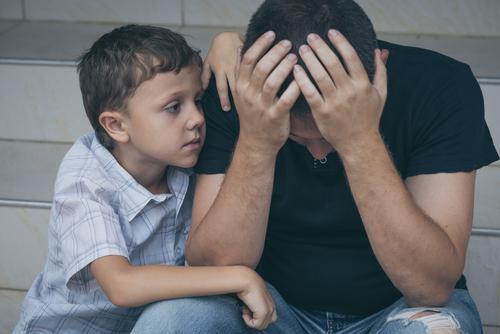It can be difficult to be parents with mental illness. It is not easy to live with and the challenges often extend beyond the individual and affect everyone around them. If you or someone you know is struggling with this, we hope this article provides some help and support.
Contents
- 1 Parents With Mental Illness
- 2 Mental Illness Stigma
- 3 Challenges Of Being Parents With Mental Illness
- 4 How Can Parents With Mental Illness Help Their Children?
- 5 Why Is It Important For Parents To Seek Help?
- 6 Effects Of Untreated Mental Illness On Family
- 7 How To Cope With Illness?
- 8 Coping With The Challenges Of Having A Mentally Ill Parent
- 9 Effects Of Mental Illness On Parenting
- 10 Ways To Help Your Children Understand The Situation
- 11 Treatment For Mental Illness
- 12 Conclusion
Parents With Mental Illness

Mental illnesses in parents are quite common. It is often not until the child starts exhibiting symptoms that they will be referred to a psychiatrist. This is when the parent may be seen for depression, bipolar disorder, or other mental health disorders. The psychiatric assessment may uncover that there are both depressive episodes and manic episodes.
Parents with mental illness can provide many challenges to their children if they do not receive adequate treatment for their own diseases. A typical cycle of parental behavior includes manic episodes (or “being on”) followed by depressive episodes (or “being down”). It leads to poor parenting skill-sets during each episode. This cycle typically alternates between the two and affects the individuals and those around them. Including children of these parents who then exhibit symptoms of their own. These symptoms may include withdrawal, difficulty in school, mood swings, or behavioral issues.
Mental Illness Stigma
Mental illness is common, but mental illnesses in parents are still often stigmatized. Although it might be difficult, you shouldn’t let this stop you from seeking help if needed. Everyone deserves to see their children grow up and be as mentally healthy as possible. It can be difficult to live with mental illness. This article explains the challenges of being a parent with mental illness and how you might cope with them. It also provides tips on how to help your children understand the situation and offers resources for support.
It is important for parents with mental illness to have assistance so that their children can be given balance within their lives. Having adequate support systems in place can greatly reduce the impact on children and their overall development.
Parents with mental illness need to be aware of the possible consequences for their children so that they can take preventative measures wherever possible. Seeking treatment immediately will not only assist parents but will ultimately help reduce the stress experienced by children as well.
Challenges Of Being Parents With Mental Illness
One of the first things people think of when someone says they have a mental illness is how it will affect their loved ones. A lot of time, people don’t even know that they are suffering from an illness until it’s too late to do anything about it. Parents who are suffering from any kind of mental illness are at risk of crossing boundaries with their children. Such as neglecting them, projecting negative feelings onto them, and neglecting their own responsibilities as caregivers.
Children who live with mentally ill parents often face many difficulties including embarrassment, anger, guilt, and shame. They may also withdraw from activities they enjoy or take on the caregiver role themselves in order to feel more in control of their own lives.
It is very important that parents with mental illness try to get the help they need so that they can have a balance of mind, body, and spirit for themselves and their children. Having adequate support systems in place will greatly reduce the impact on children’s development.
Impact On The Child’s Development

Parents with mental illness can present challenges to children that impact them on many levels including physically, behaviorally, and emotionally. The parent-child relationship is an important one and parents are generally role models for their children. Seeing someone who suffers from mental illness can be very confusing for children and they may experience a wide range of emotions.
- Children under these circumstances often feel as though their world is falling apart and they do not understand why this is happening. They may lose trust in those around them and so find it difficult to form close relationships with others, including peers and authority figures.
- Children may also develop low self-esteem because their parent does not demonstrate positive role-modeling behavior or boundary-setting skills. This can lead to the child losing respect for parents and/or displaying challenging, defiant, and oppositional behaviors themselves.
- When parents suffer from mental illness, it is not uncommon for children to feel embarrassment, anger, guilt, and/or shame.
- Some children may attempt to take on the role of the caregiver as a way to feel more in control of themselves. Others will withdraw from intimacy with others as well as activities that they used to enjoy.
Not Being Able To Cope With Symptoms
One of the main challenges that parents with mental illness face is not being able to cope with their symptoms. Having a mental illness can have very negative effects on not just their own life but also the life of those around them. Symptoms include feelings of sadness, guilt, anger, or having no motivation for the things they once enjoyed. Symptoms can come and go over time, but when it is happening it can be very hard for the sufferers to remain in control of their thoughts and actions. This inability to properly cope with symptoms has the potential to cause large problems within families.
Risk Of Causing Harm To Children

Parents who are suffering from mental illness also run the risk of causing harm to their children. Neglect of the parental role is usually the biggest issue that children have to face when they have parents with mental illnesses. Things like feeling abandoned, being ignored, or having no attention paid to them are common issues they will deal with if their parents cannot properly care for them.
Children who suffer from neglect may act out in ways that can cause harm. They may be more likely to experiment with drugs and alcohol or engage in unprotected sex. Thereby increasing the chances of both themselves and other people getting sick.
It is very important that parents seek help for their mental illness so that they do not put their children at risk. Because if too much time goes by without treatment. It can be harder to treat as the symptoms may become more severe and frequent.
How Can Parents With Mental Illness Help Their Children?
Parents who suffer from mental illness should strongly consider getting help for themselves so that they do not harm their children. If they are not yet willing or able to seek help, then it is very important for them to get help for their children. This may include family members or friends who can take care of the children when it is not possible for the parents to do so themselves.
Parents with mental illness may also need to consider getting professional help for their parenting abilities. While they are looking after their own well-being, there are other people in their lives who will be willing to help out with the children. If their mental illness means they cannot properly care for their children then other options should be considered such as daycare or relatives that can take care of the kids while the parents get into a routine that works best for them and their situation.
Why Is It Important For Parents To Seek Help?

It is extremely important for parents with an untreated or poorly treated mental illness to get help because they would be at a much higher risk of abusing their children in some way. Parents with mental illness may not be able to properly cope with symptoms, which could lead to anger or frustration, and these emotions could result in child abuse if the parent has no one else available to help them through their feelings.
Parents who suffer from untreated or poorly treated mental illness are also at a much higher risk of neglecting their children. They may not be able to get out of bed or leave the house, which could lead to leaving their children at home alone without food or care.
Allowing parents with mental illness access to treatment can make sure they get the help they need so that they do not become so overwhelmed by their symptoms that it results in abuse or neglect towards others.
Effects Of Untreated Mental Illness On Family
There can be many negative effects when mental illness is not treated within a family. When parents suffer from an untreated or poorly treated mental illness it can lead to them abusing children, abusing their spouse, or neglecting their children.
Neglect can be very harmful because it means that the child doesn’t get the attention they need in order to grow into a healthy adult. Not having enough food or clothing, not getting time spent on education and social development, and lack of love and care from the parents could result in a child becoming sick or even dying. It can also cause many behavioral problems in the child that may not be present if they were raised in a healthy environment.
If parents suffer from an untreated or poorly treated mental illness, it could lead to them abusing their spouse. They may become angry and take out their feelings on another person which is why untreated or poorly treated mental illness can lead to domestic violence.
The lack of treatment can also result in the children themselves developing a mental illness that would affect their lives and they may not be able to make it through life as productively as someone who does not suffer from a psychological disorder.
How To Cope With Illness?

There are many ways that a person can cope with a mental illness. This may include seeking professional help, talking to friends or family members, or joining a support group.
Professional help can be extremely beneficial for someone who is struggling with a mental illness. They will be able to work with a therapist who can help them to understand their illness and how to best manage their symptoms. The therapist will also be able to provide support and guidance during difficult times.
Talking to friends or family members can also be helpful. These people may be able to provide emotional support and they may be able to offer practical advice. It can be helpful to have someone to talk to who understands what you are going through.
Joining a support group can be beneficial if a person is struggling with a mental illness. They will be able to talk to other people who are in the same situation and work together to fight their symptoms. It can also be important because they will have someone else that they trust that understands them well.
Coping With The Challenges Of Having A Mentally Ill Parent

Parents with mental illness often do their best in caring for the emotional and physical needs of their children. However, parents with mental illness need to be aware of how it might impact their children’s development. Although they may not want to burden others with their problems. It is important that these parents seek help from a medical professional. So that they can be positive role models for their children.
Parents might only experience a few episodes of depression or mania over their lifetime. But they can still have a great impact on their child’s development. Children tend to blame themselves for the mood swings and other symptoms that parents exhibit. This is often because children are too young to understand what is happening and think that
Effects Of Mental Illness On Parenting
- Parents with untreated or poorly treated mental illness may not be able to properly care for their children or themselves. This can be dangerous and cause them to neglect or abuse their children in some way. It could also affect their emotional wellbeing as well.
- Parents suffering from untreated mental illness may not be able to properly cope with emotions such as anger and frustration. This could lead to child abuse if they have no other way of dealing with these emotions.
- Parents suffering from untreated mental illness may also not be able to seek treatment for their disorder. It can result in neglecting their children, which could affect the child’s emotional and physical wellbeing.
Because of these negative effects that untreated or poorly treated mental illness can cause, it is important that parents are able to be treated so that they can properly care for their children and themselves.
Ways To Help Your Children Understand The Situation
 It can be hard for children who have parents with mental illness. This article is about how to help them know what is going on.
It can be hard for children who have parents with mental illness. This article is about how to help them know what is going on.
- One way is to tell the children when you are diagnosed and why they need to be aware of it. You can also talk about your feelings and make sure they understand. That you don’t want them to feel bad for you or think less of themselves. Because their parent has a mental illness.
- Another way would be to let the child in on any treatment plans and explain why you’re taking the steps that you are. Such as talking about counseling or medication, etc. You can also explain what this means in terms of how much time will go into parenting. And things like chores around the house may not get done as regularly as they usually would.
- It’s also a good idea to talk about the mental illness with your child without sounding too harsh or mean to yourself. You don’t want them to think that you’re bad at being a parent because of this. But rather as a person who needs treatment and some time to recover from what they’re going through.
Treatment For Mental Illness
There are many different types of treatments for mental illness in addition to medication. Cognitive behavior therapy is just one example. This article discusses the basics of this type of therapy.
Cognitive Behavioral Therapy (CBT)
Cognitive behavior therapy is a form of therapy. It aims to help people to learn how to change the way they think about things in their life. CBT is also used as a treatment for mental illness. People who are receiving this type of therapy will be encouraged by their therapist. To find specific ways that they can change or improve the way that they are thinking about things. That should also help with their mental illness.
Some of the goals that a therapist may try to help someone achieve through CBT is to help them:
- Become more aware of what they are thinking and feeling about different situations in their life
- Be able to change or improve the way that they think and feel about things. This will also make it easier for them to improve their life
- Begin to understand which behaviors they are engaging in that may be making things worse, and learn new coping skills
CBT is a useful type of therapy because it can help people make changes in a short period of time. Even though CBT is a short-term form of treatment. Psychotherapy will still likely need to occur in order to help people manage their mental illness.
For many people, CBT is a useful treatment option because it can be used to treat different types of mental disorders. Research has shown that CBT is effective when being used for anxiety disorders, depression, eating disorders, and other psychological problems.
Recent studies have also found that combining medication with CBT can be effective for the treatment of certain mental disorders. One of these studies was conducted by the Mayo Clinic and looked at general anxiety disorder.
Conclusion
When someone is struggling with a mental illness. It can often be challenging to find appropriate treatment options that are helpful. The more you understand about your particular condition. The easier it will be for you to find a treatment that will work for you. It’s also a good idea to make sure that your therapist is updated on any medications that you are currently taking. That way the two of you can determine what might be best for treating your mental illness. And make it easier for you to manage your day-to-day life.
For more information, please contact MantraCare. Parenting is a challenging yet rewarding experience that is crucial for the development and well-being of a child. If you have any queries regarding Online Parenting Counseling experienced therapists at MantraCare can help: Book a trial therapy session


